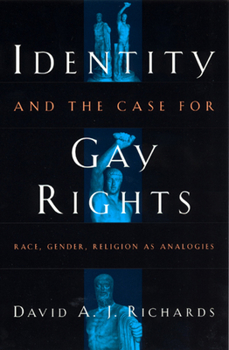Identity and the Case for Gay Rights: Race, Gender, Religion as Analogies
Select Format
Select Condition 
Book Overview
How should we chart a course toward legal recognition of gay rights as basic human rights? In this enlightening study, legal scholar David Richards explores the connections between gay rights and three successful civil rights movements-black civil rights, feminism, and religious toleration-to determine how these might serve as analogies for the gay rights movement. Richards argues that racial and gender struggles are informative but partial models. As in these movements, achieving gay rights requires eliminating unjust stereotypes and allowing one's identity to develop free from intolerant views. Richards stresses, however, that gay identity is an ethical choice based on gender equality. Thus the right to religious freedom offers the most compelling analogy for a gay rights movement because gay identity should be protected legally as an ethical decision of conscience. A thoughtful and highly original voice in the struggle for gay rights, David Richards is the first to argue that discrimination is like religious intolerance-denial of full humanity to individuals because of their identity and moral commitments to gender equality.
Format:Paperback
Language:English
ISBN:0226712095
ISBN13:9780226712093
Release Date:January 2000
Publisher:University of Chicago Press
Length:241 Pages
Weight:1.05 lbs.
Dimensions:0.6" x 5.5" x 8.5"
Customer Reviews
1 rating
Brilliant Case for Gay Rights
Published by Thriftbooks.com User , 24 years ago
Richards has advanced the constitutional argumentation for gay rights in a profound way. He has analogized the case for gay rights to arguments for racial, gender, and religious equality and concluded that attempts to find a genetic or "innate" basis for homosexuality are no more likely to provide grounds for equality than to provide grounds for continued inequality and discrimination. Instead, Richards argues that the manner in which gay men and lesbians deal with life, love, birth, and death is ultimately a profound conscious and CONSCIENTIOUS choice that warrants the same type of respect accorded freely chosen religious beliefs.Thus, the denial of equal rights to gay men and lesbians imposes an impermissible "moral slavery" that advances a sectarian view (of the immorality of homosexuality) while dehumanizing homosexuals and relegating their conscience, feelings, and choices to a sphere of "unspeakability." This goes against the very nature of freedom of religious belief. He finds such "moral slavery" against gay men and lesbians unsupportable, in part, because it relies on inaccurate and negative stereotypes, and it applies a double standard to same-sex relations that it does not similarly apply to heterosexual relations (e.g., no compulsory procreation for heterosexual marriage).On the whole, an excellent piece of scholarly research that every lawmaker, jurist, and attorney should read to respond to the call of gay equality.





